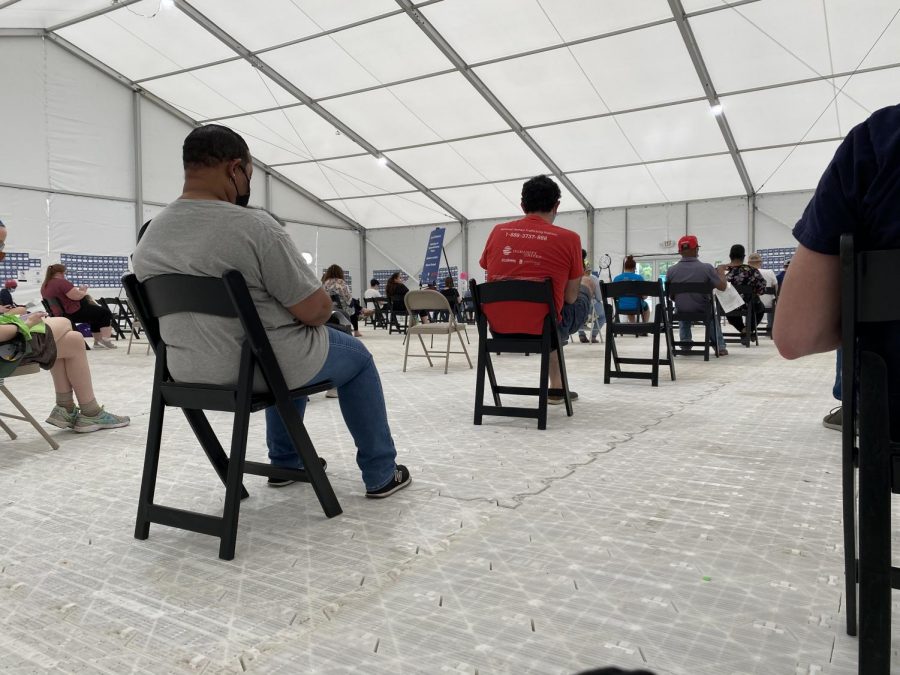Can MCPS mandate students to have the COVID-19 vaccine?
The COVID-19 Mass Vaccination Site at Greenbelt Metro Station in Md. Since April 6, all students 16 and older have been eligible to receive the vaccine.
May 3, 2021
It’s been a topic of intense debate for years. We’ve seen protests, debates and demonstrations, all trying to provide answers to the same question: can vaccines be mandatory? And if so, does this give WCHS the right to mandate COVID-19 vaccines for in-person students?
The short answer is yes. Schools are permitted to mandate vaccines, and once the vaccine is eligible for all students, MCPS can add it to its list of already mandated vaccines that include Tetanus and Meningitis shots.
But the long answer goes all the way back to 1905. According to the Harvard Law Review, Massachusetts was one of 11 states with compulsory vaccine laws. When an outbreak of smallpox in the city of Cambridge prompted mandatory vaccinations, Pastor Henning Jacobson recalled his childhood story of a vaccination gone wrong.
Jacobson was fined $5 for not getting vaccinated, and he decided to sue the state. He argued that the law was “unreasonable, arbitrary and oppressive,” and that it violated the Fourteenth Amendment’s right that “no state shall make or enforce any law which shall abridge the privileges or immunities of citizens of the United States.”
However, in the case of Jacobson v. Massachusetts, the Supreme Court disagreed. It ruled, in a 7-2 majority, that states are permitted to enforce mandatory vaccinations. They argued that the government has the job to protect its citizens and promote common welfare. They said that compulsory vaccinations are a reasonable and proper exercise of the police power, which gives states the authority to create and enforce health laws.
This ruling is over 100 years old, and is still cited by most as a way to enforce vaccines. And in MCPS, the groundwork already exists for such a divisive move.
When students attend an MCPS school, they are required to have numerous vaccinations, as mandated by the state of Maryland, with different grade deadlines. By the time that students enter 1st grade, they must have at least three shots of the DTaP vaccine (Diphtheria, Tetanus, Pertussis), three shots of the Polio vaccine, two Measles/Mumps/Rubella shots, two Chickenpox vaccinations and three Hepatitis B shots. By the time that students enter 7th grade, this list grows to include the Tdap (Tetanus, Diphtheria, Pertussis) vaccine and the Meningococcal vaccination.
If students do not wish to get the required vaccinations, there are exemptions available. 45 states (Maryland included) grant exemptions for religious reasons. 15 states also grant exemptions because of personal/philosophical beliefs about vaccines, but Maryland does not (and should not) offer these exemptions.
As part of the ruling set forth in Jacobson v. Massachusetts, states are required to provide equitable vaccine access if they choose to mandate. To comply with this, MCPS offers free vaccination clinics for all required vaccines.
If MCPS chooses to mandate COVID-19 vaccines for the 2021-22 school year, they must ensure that all students are able to be freely and easily vaccinated. This should not be a problem, as Pfizer has applied for emergency authorization for 12-15 year olds to take the Pfizer-BioNTech vaccine.
Every year, MCPS should do everything they can to protect students inside and outside their buildings. Even when faced with disagreement, MCPS has almost always chosen to do the right thing to make sure that every student feels safe. Next year should be no different, which starts by mandating the COVID-19 vaccine.


